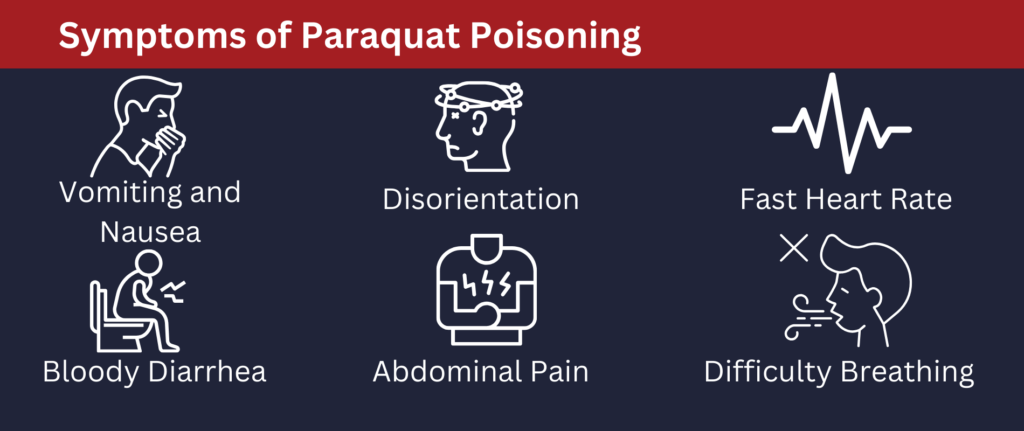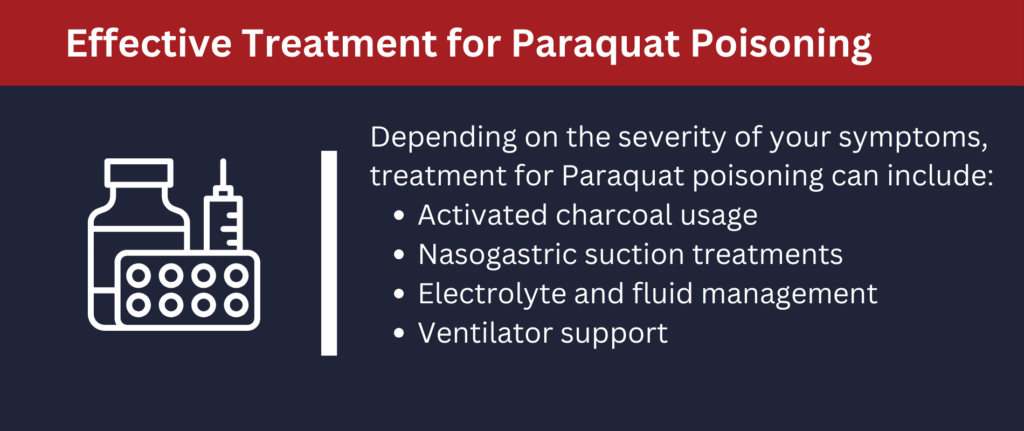
Agricultural workers, farmers and licensed herbicide applicators are all at risk of paraquat poisoning. Paraquat is a toxic herbicide that is manufactured by several major companies, including Syngenta and Chevron Phillips Chemical. Unfortunately, this effective herbicide is killing more than just weeds. Ongoing studies have proven that accidental poisoning can result in severe life-threatening injuries in a matter of minutes.
What is Paraquat?
Paraquat is a toxic weed killer. Its use is restricted to people who are commercially licensed to use it. Despite being banned in 32 other countries, paraquat is still one of the most popular herbicides on the market. Paraquat poisoning can occur through ingestion, inhalation or skin exposure. Over 70% of herbicide poisonings from ingestion, inhalation, or skin exposure result in death. The poisoning is a rapid process, with life-threatening symptoms that develop quickly.
Paraquat Manufacturers
Several companies continue to produce paraquat, despite the dangers associated with short-term and long-term exposure.
These major manufacturers include:
- Syngenta
- Bayer
- Solera
- Chevron Phillips Chemical
How Herbicide Exposure Occurs
Poisoning can occur through ingestion, by eating or drinking items that were inadvertently exposed to the chemical. Exposure can also occur through skin exposure or inhalation. When the chemical is sprayed on plants and allowed to dry, a person is at a higher risk of inhaling the toxic fumes from the chemical’s dried form. Because of this, licensed applicators are required to wear masks.
How to Tell if You’ve Been Poisoned by Paraquat
Paraquat has a very sharp odor. In the U.S., the chemical is dyed a bright blue to prevent a person from accidentally confusing it with a beverage. If you have worked with paraquat and didn’t wear protective gear, then you may have been exposed to it.
These days, among the general public, paraquat poisoning is rare. However, if you’re a licensed paraquat applicator, you work on a farm or a field, or live close to one, you’re at a higher risk for exposure. Unfortunately, some people are exposed to paraquat without even realizing it.
The consequences of exposure can be severe. Herbicide poisoning can make some people fall ill quickly, within a matter of minutes, hours, or even weeks after ingestion.
Symptoms of Paraquat Poisoning

Gastrointestinal symptoms due to poisoning are often severe. The symptoms can include rapidly falling blood pressure and dehydration. Even ingesting a small dose of paraquat can result in a fatal outcome.
The symptoms to watch for include:
- Disorientation
- Fast heart rate
- Difficulty breathing
- Abdominal pain
- Bloody diarrhea
- Vomiting and nausea
The ingestion of paraquat in large amounts can lead to life-threatening conditions including pulmonary edema, kidney failure, lung failure and renal failure. If you’ve experienced mild symptoms after handling or working with paraquat, then you may have been exposed.
Short and Long-Term Effects of Herbicide Poisoning
Symptoms of poisoning can vary and will depend on the amount of exposure. For example, ingesting a large quantity of the chemical can cause acute poisoning, with symptoms that appear quickly.
Short-Term Effects of Exposure
The initial symptoms of poisoning through paraquat ingestion are immediate and will begin with swelling and pain in the throat and mouth. When paraquat enters the stomach, it will cause gastrointestinal problems including nausea, vomiting and diarrhea.
These symptoms can occur within minutes, hours or days after exposure and can result in death.
The side effects of short-term exposure can include:
- Swelling
- Seizures
- Respiratory failure
- Muscle weakness
- Lung scarring
- Liver failure
- Kidney failure
- Heart failure
- Diarrhea
- Vomiting
- Nausea
- Fluid in the lungs
- Fast heart rate
- Confusion
- Coma
Long-Term Effects
The long-term effects of poisoning can result in health problems that impact various organs.
Agricultural workers, farmers and licensed applicators that have been exposed to the herbicide over the years may not experience acute symptoms of herbicide poisoning. But they may still experience long-term side effects from exposure. People who have been exposed to paraquat are also at a higher risk of developing Parkinson’s disease.
Agricultural workers, farmers and licensed applicators who have been exposed to the severe toxicity of paraquat for several years may experience the following effects:
- Parkinson’s disease
- Scarring of the esophagus
- Heart failure
- Cellular damage
- Liver injury
- Acute kidney failure
- Lung scarring
- Lung damage
- Pulmonary fibrosis
- Reproductive problems
- Impaired lung function
Effective Treatment for Paraquat Poisoning

People who have ingested paraquat must seek emergency medical attention. Variations in treatment often depend on the severity of the exposure.
Severe paraquat poisoning is characterized by organ failure. Patients with paraquat poisoning may experience organ failure often involving organ damage to the liver, kidneys, and lungs. With herbicide poisoning, the lungs are often the main target and respiratory failure due to lung injuries is the most common cause of fatalities.
Emergency medical attention often consists of using activated charcoal for the removal of paraquat from the body. If a patient arrives at a hospital within one hour of paraquat ingestion, nasogastric suction is often used. Patients with paraquat poisoning can require several months of ongoing conventional treatment, depending on the level of paraquat intoxication. Additional treatments may be necessary for patients who suffer an acute kidney injury, acute lung injury, or hepatic failure. Survival rates are low for patients who do not seek immediate medical care.
Conventional treatment and supportive care for herbicide poisoning can include electrolyte and fluid management in addition to pain control. Because oxygen supplementation can potentiate herbicide-induced lung injuries, it is avoided.
Other effective treatment options include:
- Kidney dialysis for potential organ failure
- Ventilator support
- Medication to improve breathing
- Medication to lower blood pressure
- IV fluids
- Alternative therapies
People who have been poisoned due to skin exposure should wash with soap and water and flush their eyes for ten to fifteen minutes using plain water. After showering and flushing the eyes, seek medical care immediately.
The Outcome of Paraquat Poisoning
Unfortunately, there is no antidote for paraquat poisoning. The outcome of paraquat poisoning can depend on the severity of the poisoning, level of absorption of paraquat and how soon after the poisoning the patient received medical care. Patients with severe poisoning often have a poor prognosis. Early treatment and aggressive decontamination to prevent further absorption after ingestion is the key to successfully treating herbicide poisoning.
Who is at Risk of Poisoning?
Farmers, agricultural workers and licensed applicators who are regularly exposed to paraquat are at a higher risk of poisoning. However, people who live near fields and farms where the chemical is sprayed can also be at risk. Medical management is necessary for people who show acute paraquat poisoning symptoms.
Is Paraquat Safe?
The toxic effects of poisoning can be devastating. While companies that produce paraquat are required to implement safety measures, such as dyeing the chemical blue to prevent accidental ingestion of paraquat, exposure to this chemical still comes with a high risk of injuries, organ failure and even death.
Does Paraquat Cause Parkinson’s Disease?
Ongoing studies have shown that exposure to paraquat can result in serious short-term and long-term side effects. Evidence has demonstrated that poisoning can cause serious injury, including renal failure, liver failure, heart failure and lung scarring.
Clinical studies have provided mounting evidence that indicates paraquat toxicity can also increase the risk of developing Parkinson’s disease. A study that was published in Environmental Health Perspectives in 2011 raised concerns regarding the connection between Parkinson’s disease and paraquat use. Human studies found that long-term exposure could increase a person’s chance of developing Parkinson’s disease by 200%.
Parkinson’s Disease and Paraquat Exposure
Parkinson’s disease is a progressive neurodegenerative disorder. Several studies have linked paraquat exposure to the development of Parkinson’s disease. These studies have found that the herbicide increases the risk for this disease by creating oxidative stress. The oxidative stress kills or severely damages neurons in the brain that are responsible for dopamine production. Treatment of patients with Parkinson’s disease is ongoing. There is no cure for PD. Around-the-clock care is often necessary for the late stages of the disease.
This link to paraquat exposure and Parkinson’s disease has resulted in several California paraquat lawsuits filed against the manufacturers of this toxic herbicide.
Paraquat Lawsuits
Paraquat lawsuits claim that the herbicide is dangerous, defective, and has resulted in farmers, agricultural workers and licensed applicators developing Parkinson’s disease. Victims of paraquat exposure claim the manufacturers of the herbicide failed to warn them of the dangers of using this product despite their knowledge of how harmful this chemical is.
Contact A Paraquat Lawyer at Nadrich Accident Injury Lawyers Today
If you believe you have been poisoned by paraquat due to short-term or long-term exposure, or you have been diagnosed with Parkinson’s disease due to paraquat use, you may be entitled to compensation. Speaking with a paraquat lawyer as soon as possible can protect your rights and your legal claim to compensation from negligent manufacturers.
Contact Nadrich Accident Injury Lawyers today at 800-718-4658 or text or email to schedule a no-obligation consultation. This case review session is at no cost to you. We can meet with you to discuss your case and answer any questions you may have, so you will leave our office knowing what your legal rights and options are moving forward.
At Nadrich Accident Injury Lawyers, we will fight for your right to compensation from the negligent manufacturers who failed to warn consumers of the harm this toxic herbicide causes.

